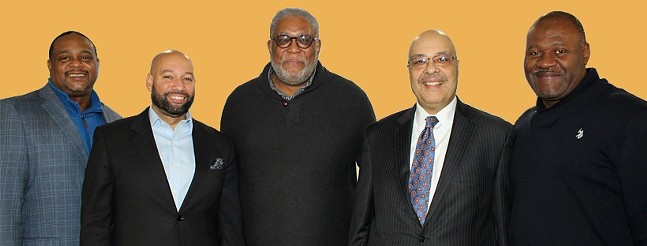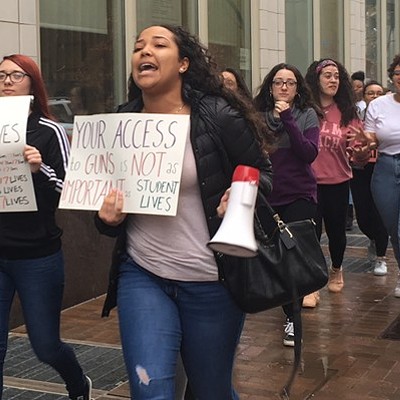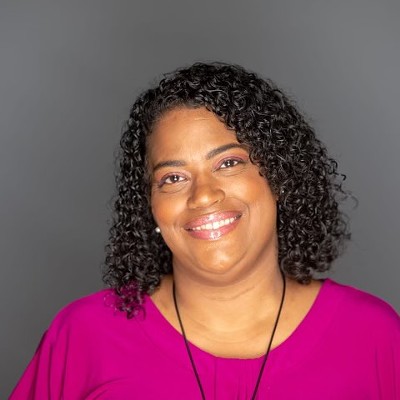Tuesday, February 27, 2018
Pittsburgh black elected officials say black-business community needs entrepreneurial reform

Photo courtesy of Pittsburgh Black Elected Officials Coalition
From left to right: Ed Gainey, Daniel Lavelle, DeWitt Walton, Ricky Burgess and Jake Wheatley
The Pittsburgh Black Elected Officials Coalition (PBEOC) is hoping to change that. Since its establishment two years ago, the PBEOC has embarked on collecting recommendations from the community, and throughout the process, an overwhelming majority of constituents called for business and organizational development reform as a top priority.
The coalition met on Feb. 26 at the Community Empowerment Association, in Homewood, to establish initiatives encouraging black entrepreneurial growth. At the meeting, business organizations looked to pursue relations with current and emerging businesses from the African-American community and strengthen relations between minority and women business owners.
“You [the residents] sent us out to build partnerships into a reality and not just words, so tonight we have our partners ... to show you what they can do for you,” said Pennsylvania State Rep. Jake Wheatley (D-Hill District). “Commit to us the same way we commit to you to stay in this process.”
Wheatley is a member of the PBEOC, which also consists of Allegheny County Councilor DeWitt Walton (D-Hill District), Pennsylvania State Rep. Ed Gainey (D-East Liberty) and Pittsburgh City Councilors Ricky Burgess (D-North Point Breeze) and Daniel Lavelle (D-Hill District).
Coalition members wanted to make sure black entrepreneurs weren’t overly reliant on area nonprofits. Mark Lewis, president and CEO of the POISE Foundation, a nonprofit that distributes funds from other local foundations groups throughout the black community, attended the meeting. He said that there are pros and cons to local foundations providing funds for the black business community. Since his election in 2007, Burgess has used POISE to handle the process of distributing his district's Community Development Block Grant Funds.
“Pittsburgh is blessed and cursed to have strong nonprofit donations,” Lewis said. Members of the coalition said that while nonprofit funds can help a business get started, the business can become too dependent on those grants.
And other organizations at the meeting agreed and are looking to provide a boost, not a handout, to local African-American businesses. Regional business-coalition Allegheny Conference CEO Stefani Pashman said her group is committed to increasing the number of black businesses participating in the region’s corporate supply chain. Pittsburgh Mayor Bill Peduto was also in attendance and showed support for business-supporting strategies like providing fiscal sponsorship that would raise money to grow and promote the black community.
This aligns with a 2015 Pittsburgh Foundation commitment to the “100 Percent Pittsburgh” initiative. Under this promise, the foundation devotes itself to ensuring that the region’s economic prosperity is shared among all city neighborhoods.
“We’re 100 percent committed to the [Pittsburgh economic] renaissance, but if 100 percent of the people don’t participate in this, then it’s a failure,” said Max King, CEO of the Pittsburgh Foundation. “Right now, 30 to 40 percent of people in this region are not participating.”
Since meeting with more than 400 constituents in six neighborhoods in PBEOC’s first phase, the coalition received more than 300 recommendations. During the second phase, 85 residents prioritized the recommendations with a critical eye toward public safety, affordable housing, family outcomes, businesses, education and employment. The coalition then brought these talking points to community leaders.
Moving forward, the PBEOC committed to continuing with a transparent approach to advocating for resources to give to the community. Walter Lewis, interim president of Homewood Children’s Village, closed the event by reminding citizens that more than ever they need to get involved if any sort of change is going to happen. He said that residents need to make sure their community leaders live up to their promises.
“Our piece as citizens is to pay attention,” Lewis said.
Tags: Pittsburgh Black Elected Officials Coalition , DeWitt Walton , Ed Gainey , Ricky Burgess , Daniel Lavelle , Bill Peduto , Allegheny Conference , Pittsburgh Foundation , Homewood , Jake Wheatley , Stefani Pashman , entrepreneur , African-American , Image















